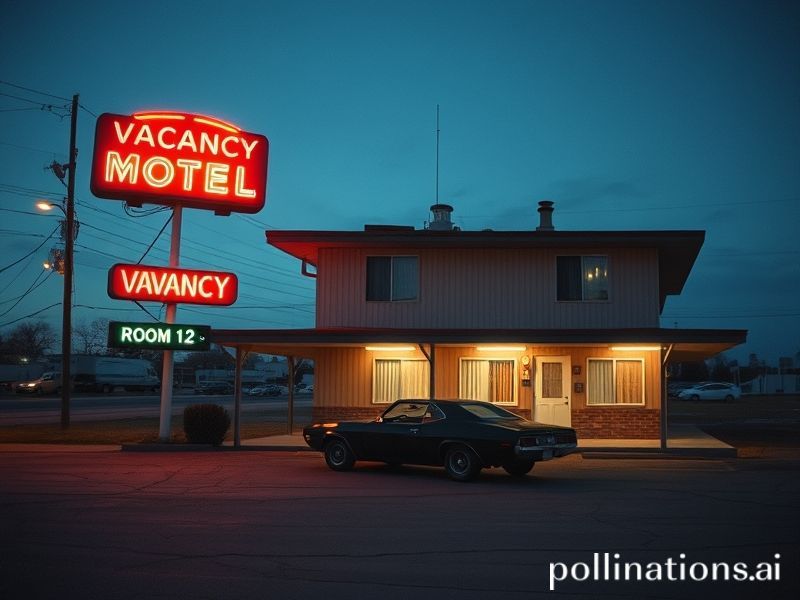Global Motel: The World’s Most Honest Embassy Where Everyone Checks In But No One Leaves the Same
The Global Motel: A Passport to Nowhere, Everywhere
From the neon vacancy sign flickering like a dying star in Tucson to the fluorescent corridor in Ankara that smells of boiled cabbage and secrets, the motel is humanity’s most honest embassy. It claims no flag, demands no visa, and yet every nation has one—usually wedged between a truck stop and a vague promise of redemption. Step inside and you’re a citizen of the Republic of Transit, population whoever just handed over a credit card and a fake license-plate number.
In theory the motel is American kitsch, born in 1925 when an architect in San Luis Obispo bolted six bungalows together and called it the “Milestone Mo-Tel.” In practice it has become the world’s most democratic institution, democratizing disappointment on every continent. Latin America prefers the “hostal de paso,” where rooms are rented by the hour and the Bible in the drawer has been replaced by a laminated menu of sins. Japan offers the love hotel, complete with karaoke mics that double as marital aids, proving that efficiency is indeed the Japanese way. Across the former Eastern Bloc, Soviet-era motels still serve as informal archives: cigarette burns on the nightstand commemorate revolutions that never quite happened.
The pandemic was supposed to kill the motel, that petri dish on the interstate. Instead it became a triage ward, a pop-up quarantine, and—thanks to government vouchers—a reluctant social-service agency. In Toronto, a Super 8 off the 401 sheltered refugees awaiting immigration hearings and gig-economy drivers awaiting surge pricing. Everyone shared the same vending-machine dinner: stale samosas and existential dread. Meanwhile, in Dubai, luxury motels rebranded themselves as “micro-resorts,” charging five-star prices for the same polyester duvet and a view of the parking lot—postmodern capitalism’s greatest magic trick.
Zoom out and the motel is a geopolitical barometer. When the US–Mexico border tightened, Arizona motels filled with deportees clutching manila envelopes like failed passports. When Russian truckers faced sanctions, Siberian motels became black-market exchanges: diesel for euros, euros for SIM cards, SIM cards for the faint hope of Wi-Fi. Climate change has added a new layer. In flood-prone Bangladesh, floating motels—converted river barges—offer rooms by the nautical mile, life jackets included in the minibar. The towels may still be scratchy, but at least they’re absorbent enough to sop up your tears about rising sea levels.
The staff are the motel’s true diplomatic corps. Night auditors fluent in four languages but paid in none of them mediate disputes over who clogged the bidet at 3 a.m. In Lagos, the concierge doubles as a currency speculator; in rural France, the owner’s cat doubles as the entire security detail. They are the last witnesses to the great human caravan: the cheating spouses, the touring punk bands, the vaccine tourists, the minor YouTube celebrities livestreaming their breakdowns. Every key card is a temporary visa stamped by someone who stopped believing in permanence long before you did.
And yet, beneath the grime and the gouged furniture, there is a melancholy solidarity. The couple in Room 212 may be plotting divorce, but they’re using the same flickering ice machine as the newlyweds in 214 who are plotting a future that will, statistically, end in the same flickering ice machine. The motel is where the world’s narratives briefly overlap before driving off in opposite directions, leaving behind half-empty bottles of shampoo and fully empty promises.
As COP summits debate carbon offsets and nations erect ever taller walls, the motel quietly practices open borders. It doesn’t care about your politics, only your credit limit. In that sense it is both the most honest and the most hopeless place on Earth—a reminder that we’re all just passing through, usually with a USB charger we’ll forget in the socket. The neon vacancy sign keeps blinking, a Morse code for the damned: “Vacancy, always vacancy.” Somewhere in the night, a tired planet checks in, hoping for a late checkout it will never get.







